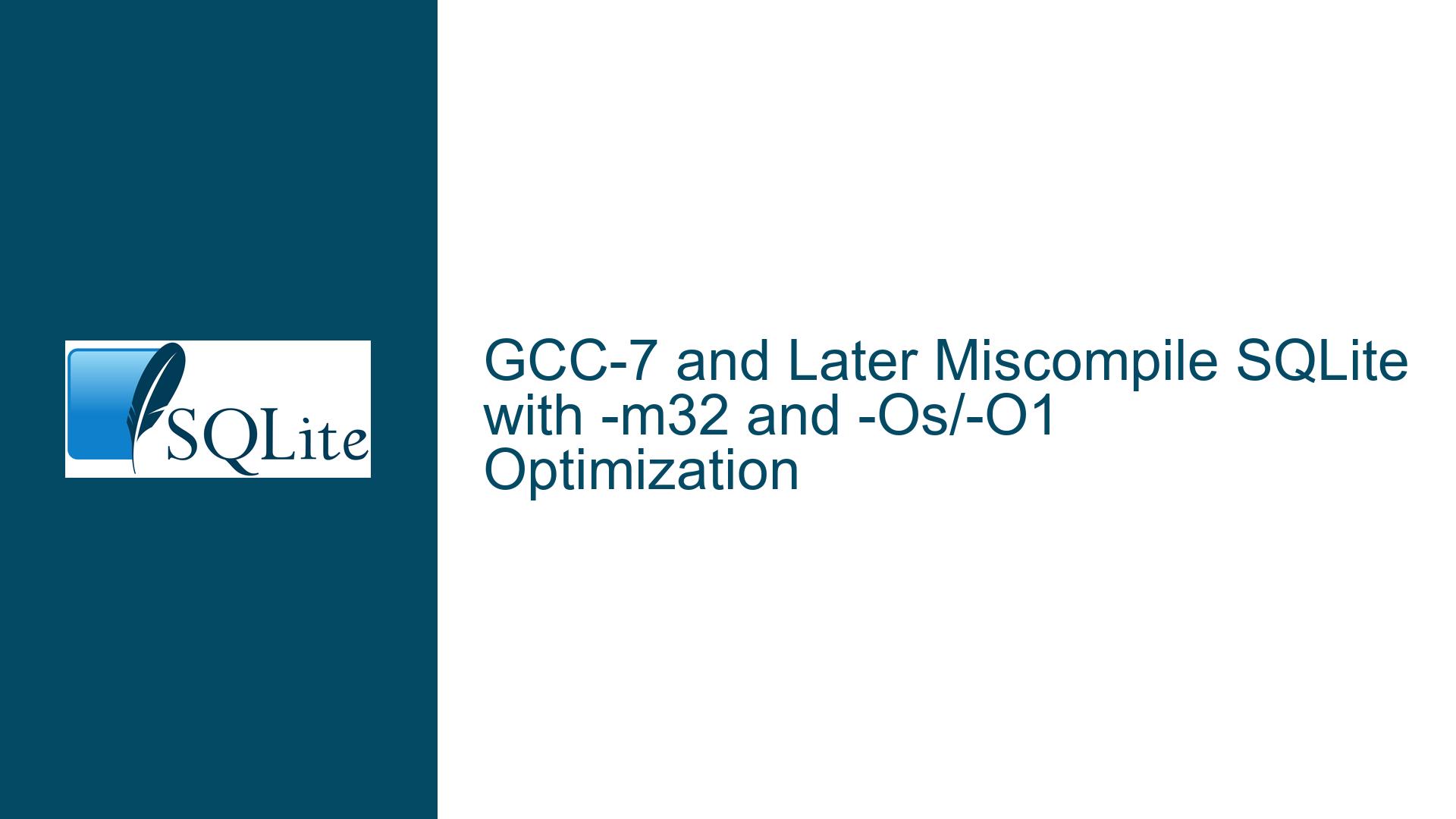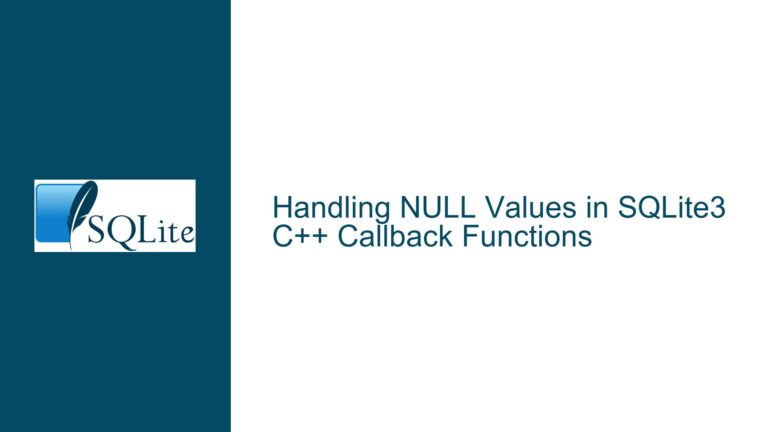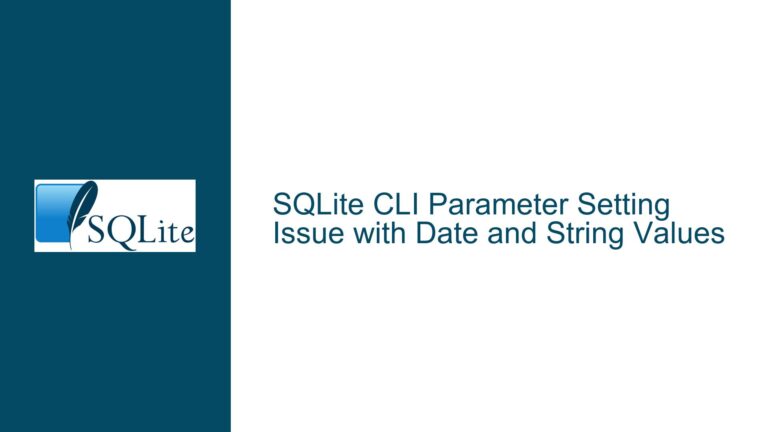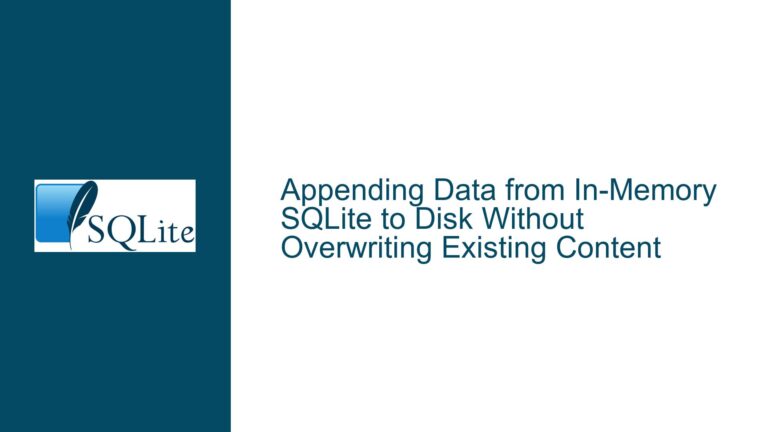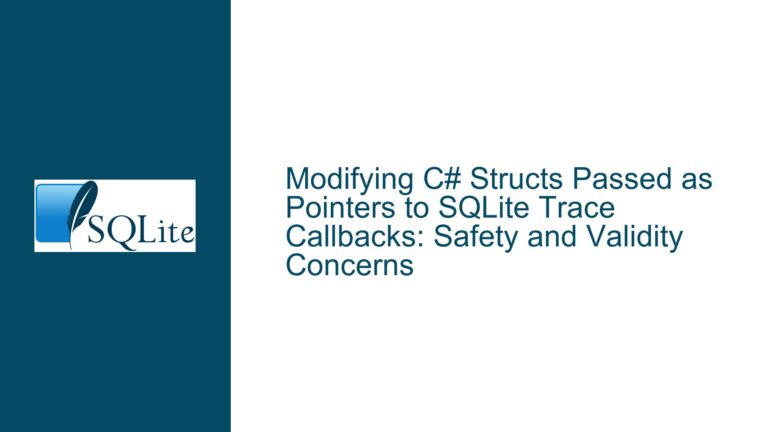GCC-7 and Later Miscompile SQLite with -m32 and -Os/-O1 Optimization
GCC-7 Miscompilation of SQLite on X86_64 with -m32 Flag
The core issue revolves around a miscompilation bug in GCC versions 7 and later when compiling SQLite on X86_64 platforms with the -m32 flag and optimization levels -Os or -O1. This bug manifests when specific 64-bit integer values are queried, leading to incorrect results. For instance, a query like SELECT -2251799813685249; may return -1 instead of the expected value. The bug is particularly insidious because it only occurs under specific conditions: when compiling with the -m32 flag (which targets 32-bit architecture on a 64-bit platform) and when the optimizer is enabled with -Os or -O1. The affected integer range is between -2533274790395904 and -2251799813685249, specifically 64-bit integers whose upper 16 bits are 0xfff7.
This issue was discovered during full release testing of SQLite on Ubuntu 20.04, which uses GCC 9.3.0 by default. Previous testing on Ubuntu 16.04, which uses GCC 5.4.0, did not exhibit this problem. The bug has been reported to the GCC bug tracker (Bug #96270), and a workaround has been attempted in SQLite check-in 9679c0c61131f0e9. However, the workaround may not cover all instances of the problem, so caution is advised when building SQLite applications with GCC 7 or later using the -m32 flag.
Interrupted Integer Handling Due to GCC Optimization Bug
The root cause of this issue lies in how GCC versions 7 and later handle 64-bit integer operations under specific optimization levels when targeting 32-bit architecture on a 64-bit platform. The -m32 flag instructs the compiler to generate code for a 32-bit environment, which involves certain trade-offs in how 64-bit integers are processed. When combined with the -Os or -O1 optimization flags, the compiler attempts to optimize the generated code for size or speed, respectively. However, in this case, the optimization process introduces a bug that incorrectly handles 64-bit integers within the specified range.
The bug specifically affects integers whose upper 16 bits are 0xfff7. This pattern seems to trigger an erroneous optimization path in the compiler, leading to incorrect object code generation. The result is that certain 64-bit integer operations, particularly those involving the affected range, produce incorrect results. For example, the query SELECT -2251799813685249; should return the exact value -2251799813685249, but due to the miscompilation, it returns -1 instead.
This issue is particularly problematic because it is not immediately obvious. The miscompilation does not cause a crash or an obvious error; instead, it silently produces incorrect results. This makes it difficult to detect without thorough testing, especially in applications that rely on precise integer calculations. The bug’s specificity to certain compiler flags and integer ranges further complicates the matter, as it may not manifest in all builds or under all conditions.
Implementing Workarounds and Safe Compilation Practices
To mitigate the GCC miscompilation issue, several steps can be taken. The first and most straightforward approach is to avoid using the -m32 flag when compiling SQLite on X86_64 platforms. If 32-bit compatibility is not a requirement, compiling for the native 64-bit architecture will bypass the bug entirely. However, if 32-bit compatibility is necessary, there are alternative strategies to consider.
One such strategy is to use a different optimization level. The bug appears to be triggered specifically by the -Os and -O1 optimization flags. Switching to -O0 (no optimization) or -O2 (higher optimization level) may avoid the issue. However, this approach comes with trade-offs. Disabling optimization entirely (-O0) can result in larger and slower binaries, while using -O2 may introduce other, unrelated issues due to more aggressive optimization.
Another approach is to apply the workaround implemented in SQLite check-in 9679c0c61131f0e9. This workaround attempts to address the miscompilation issue by modifying the SQLite source code to avoid the problematic optimization paths. However, as noted in the original discussion, this workaround may not cover all instances of the problem. Therefore, it is essential to thoroughly test any application built with this workaround to ensure that the issue is fully resolved.
In addition to these strategies, it is crucial to maintain a robust testing regimen, especially when using newer compiler versions or optimization flags. Automated tests that include edge cases, such as the specific integer range affected by this bug, can help detect issues early. Furthermore, keeping abreast of compiler updates and bug reports, such as the GCC bug tracker entry for this issue, can provide valuable insights into potential problems and their solutions.
For those who must use the -m32 flag and cannot avoid the problematic optimization levels, another potential workaround is to manually inspect and modify the generated assembly code. This approach is highly technical and requires a deep understanding of both the compiler’s behavior and the target architecture. However, in some cases, it may be possible to identify and correct the miscompiled sections of code manually.
Finally, it is worth considering the use of alternative compilers or compiler versions. If GCC 7 or later is not a strict requirement, reverting to an earlier version of GCC (such as 5.4.0, which does not exhibit this bug) may be a viable solution. Alternatively, using a different compiler altogether, such as Clang, could avoid the issue entirely. However, this approach also requires thorough testing to ensure compatibility and correct behavior.
In summary, the GCC miscompilation bug affecting SQLite under specific conditions is a complex issue that requires careful consideration and a multi-faceted approach to resolve. By understanding the root cause, exploring various workarounds, and implementing robust testing practices, it is possible to mitigate the impact of this bug and ensure the correct operation of SQLite-based applications.
